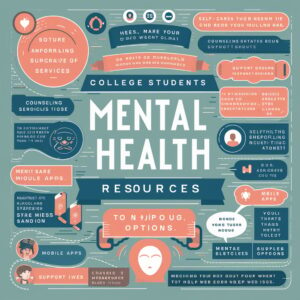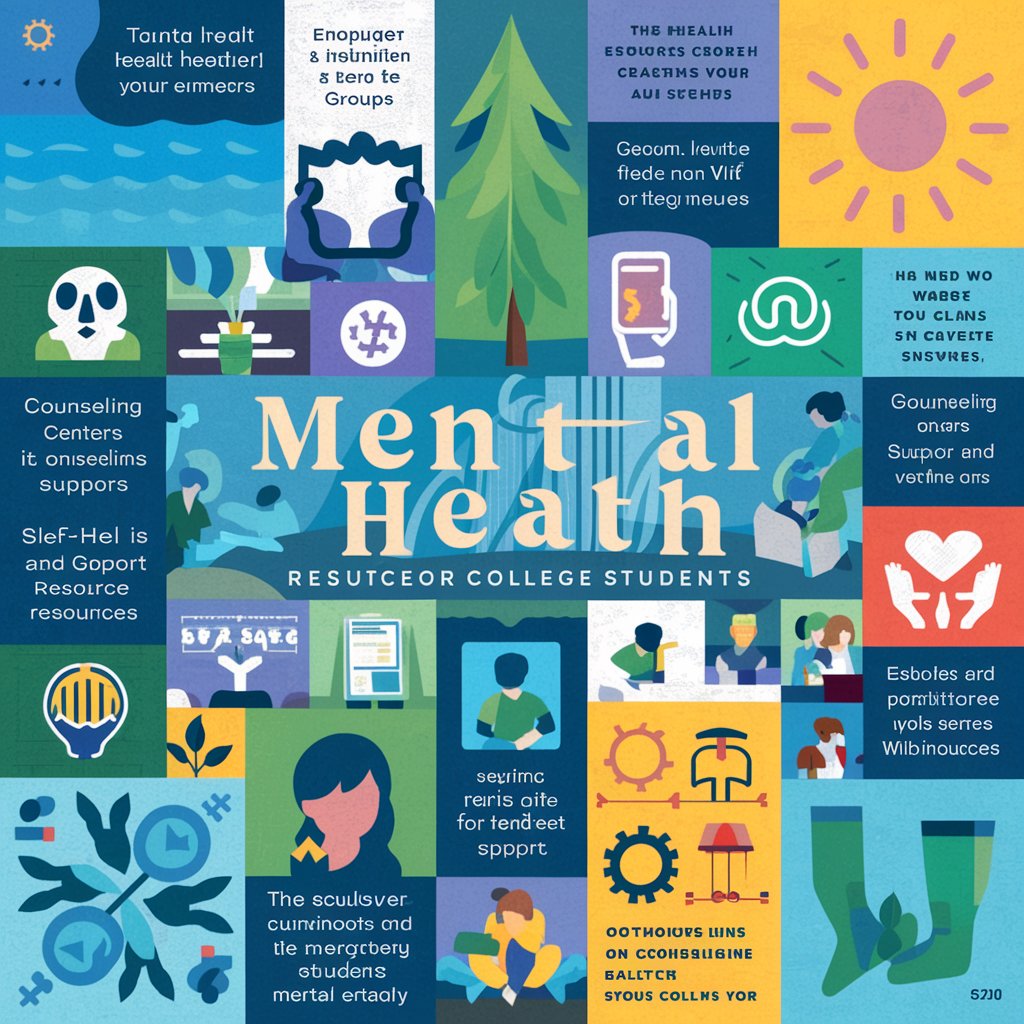
Introduction
Mental health is a crucial aspect of overall well-being, especially for college students navigating academic pressures and social changes. This guide aims to highlight various mental health resources available to college students, helping them maintain a healthy balance and seek support when needed.
Understanding Mental Health Challenges in College
College life comes with its own set of challenges that can impact mental health.
Common Mental Health Issues Among Students
Anxiety and stress
Depression
Homesickness
Loneliness
Impact of Academic Pressure and Social Stress
Balancing coursework, exams, and social life can lead to significant stress and anxiety, affecting mental health and academic performance.
On-Campus Mental Health Resources
Most colleges offer several resources to support student mental health.
Counseling Centers
These centers provide free or low-cost counseling services, offering one-on-one sessions, group therapy, and crisis intervention.
Peer Support Groups
Peer groups offer a safe space for students to share experiences and support each other through common challenges.
Health and Wellness Workshops
Workshops on stress management, mindfulness, and healthy living are often available to help students develop coping strategies.
Online Mental Health Resources
Digital resources provide convenient and accessible support for students.
Mental Health Apps
Apps like Headspace, Calm, and Moodpath offer guided meditations, mood tracking, and stress relief exercises.
Online Counseling Services
Services like BetterHelp and Talkspace provide remote counseling sessions, making it easier to seek help from anywhere.
Educational Websites and Forums
Websites like Mental Health America and forums like Reddit’s r/mentalhealth offer valuable information and community support.
Community Resources
Local community resources can also provide valuable support.
Local Mental Health Clinics
These clinics offer various mental health services, including therapy and psychiatric care, often on a sliding scale based on income.
Support Groups
Local support groups for specific issues like anxiety, depression, or substance abuse can provide additional support.
Hotlines and Crisis Centers
Hotlines like the National Suicide Prevention Lifeline (1-800-273-TALK) offer immediate support for those in crisis.
Academic Support Services
Academic challenges are a significant source of stress, but support is available.
Tutoring Centers
Tutoring centers offer help with coursework, improving understanding, and reducing academic stress.
Academic Advising
Advisors can help with course selection, career planning, and navigating academic challenges.
Disability Services
These services provide accommodations for students with mental health conditions, ensuring equal access to education.
Healthy Lifestyle Choices
Healthy habits are foundational to mental well-being.
Importance of Exercise and Nutrition
Regular physical activity and a balanced diet can significantly impact mood and energy levels.
Sleep and Its Impact on Mental Health
Adequate sleep is crucial for cognitive function and emotional regulation.
Mindfulness and Stress Reduction Techniques
Practices like meditation, yoga, and deep breathing exercises can help manage stress effectively.
Building a Support System
A strong support network is essential for mental heal

ds and Family
Stay connected with loved ones for emotional support and companionship.
Mentors and Advisors
Seek guidance from mentors and advisors who can provide professional and personal advice.
Student Organizations and Clubs
Join clubs and organizations to meet like-minded peers and build a community.
Financial Resources and Scholarships
Financial stress can impact mental health, but resources are available.
Financial Aid Offices
These offices can help you navigate tuition costs, loans, and grants.
Scholarships for Mental Health Support
Look for scholarships specifically aimed at supporting students with mental health challenges.
Budgeting and Financial Planning
Learning to budget effectively can reduce financial stress and improve overall well-being.
Self-Care Practices
Self-care is essential for maintaining mental health.
Establishing a Routine
A consistent routine can provide stability and reduce stress.
Hobbies and Recreational Activities
Engage in activities you enjoy to relax and recharge.
Setting Boundaries
Learn to say no and prioritize your well-being.
Recognizing When to Seek Help
It’s important to know when to seek professional help.
Warning Signs of Mental Health Issues
Persistent sadness, anxiety, or changes in behavior can be signs that professional help is needed.
How to Approach Someone in Need
Offer support and encourage them to seek help from a mental health professional.
When Professional Help is Necessary
If mental health issues are affecting daily functioning, it’s time to seek professional assistance.
Stigma Around Mental Health
Breaking the stigma is crucial for encouraging students to seek help.
Breaking the Stigma
Promote open conversations about mental health to normalize seeking help.
Promoting Open Conversations
Encourage discussions about mental health in classrooms, dorms, and student groups.
Advocacy and Awareness Campaigns
Participate in or organize campaigns to raise awareness about mental health issues and resources.
Success Stories and Testimonials
Hearing from others can provide hope and motivation.
Real-Life Examples of Overcoming Challenges
Stories of students who have successfully managed their mental health can inspire others.
Lessons Learned from Others
Learn from the experiences and strategies of peers who have navigated similar challenges.
Adapting to New Environments
Transitioning to college life can be challenging, but there are ways to adapt.
Transitioning to College Life
Take time to adjust and seek support during this period of change.
Coping with Homesickness
Stay connected with home while building new relationships and routines.
Navigating New Social Dynamics
Be open to new friendships and experiences while maintaining your personal values.
Conclusion
Maintaining mental health is a continuous process that requires effort and resources. Utilize the available support systems and prioritize your well-being to navigate college life successfully.
FAQs
What should I do if I feel overwhelmed and anxious?
Reach out to a counselor, talk to a trusted friend or family member, and use stress-relief techniques like deep breathing or exercise.
Are there any free mental health resources available for college students?
Many colleges offer free counseling services, and there are online resources and hotlines available for immediate support.
How can I help a friend who is struggling with mental health issues?
Listen without judgment, encourage them to seek professional help, and offer your support.
What are some quick stress-relief techniques I can use between classes?
Practice deep breathing, take a short walk, listen to calming music, or do a quick mindfulness exercise.
How do I know if I need professional mental health help?
If you experience persistent sadness, anxiety, or changes in behavior that affect your daily life, it’s important to seek professional assistance.
I hope you are having a wonderful day! I have a small favor to ask. I’m aiming to rank in the top 10 on the Chat


